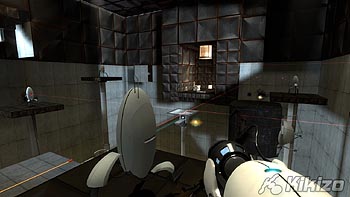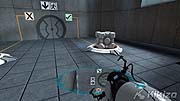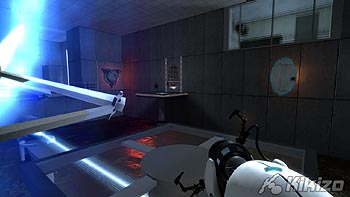Gabe Newell Valve Interview - Orange Box
We sit down for a lengthy discussion with Valve Corp's MD and co-founder, Gabe Newell, ahead of the release of The Orange Box for PC and console.
Page 2
Kikizo: Well you know, I didn't get into Blinx much, but I think we're talking about a different calibre of developer. Blinx seemed to only superficially touch on the time manipulation aspect, whereas with TimeShift, that is the game. It's like more fused into the action. You can have a weapon in your hands at one point and the very next moment it disappeared because time was frozen and it was stolen from you and now it's pointed in your back. Interesting stuff in there, and that is what I like to see, people trying new stuff. I guess Half-Life 2 is an exception, because it does everything else so well, every element... I don't think I stopped gushing over the game last time [looking at Doug, who we interviewed before]... how big fans we are of the series... but now I'm doing it again...
Gabe: Haha. But yeah, I'll check out both of those. I agree with you, that it's nice to see the category moving forward.
Kikizo: So I think you guys have said that in Episode 2, we're not going to see the powerful version of the Gravity Gun again, but given that the gravity gun type weapon in Portal is central to that game, is that going to be upgradeable within Portal somehow?
Gabe: As you play through it, different capabilities are added to it as you go through. It's not quite the same as the Gravity Gun, it's more a learning curve, once you've learned how to use it one way, more dimensions are added to it and it gets more complicated or more powerful for you to use.
Kikizo: Have you considered introducing a four dimensional time element in Portal? Well I guess portals themselves as a concept are four dimensional if you look at the math.
Gabe: Sure, just in general you can think of it as applying a transformation; like you can have two spaces that are connected by portals, but they're reverse with respect to each other, or there's some temporal shift, or use your mouse wheel to expand or contract the size of the portal which determines your size when you exit. I don't know if you remember the fixed version of that in Mario 64 where as you go through space through the tubes that change your size, except for making it dynamic. So I think you're on to something as to the direction to go with moving that gameplay forward.
Kikizo: So in Portal are we going to have a situation with one opening gate with several exits, to make things more complex, or will it always be one-two, one-two?
Gabe: I think it can become more complex, and it also gets more complex when you use it in a multiplayer environment. That's something that everybody who's worked on Portal at Valve has wanted to do, is say, now how do we use this with multiple people with opposing agendas.
Kikizo: A couple of final questions about Portal, the female voice that is well known from the trailers, are we going to learn more about her, is she going to become a character in the game maybe?
Gabe: Oh, you're going to learn a lot more about her, and her history. I think Portal's ending is one of the strongest endings we've ever done.
Kikizo: You've said that Portal exists in the Half-Life universe. And there are already some crossovers. Can you tell us about when we might learn more about the Aperture Science Center, will it come into play within the current iteration of the Half-Life series?
Gabe: You will learn more about it; whether or not it shows up like in Episode 3 or in a different vehicle, we'll definitely learn more. It's part of our universe. You can tell that when you play through it, there's a lot of affection at Valve for those characters, especially for Gladys, the computer voice.
Kikizo: So Episode 2 is all about learning a bit more, while Episode 3 will be about a resolution to a lot of things. How much is going to be resolved by the end of number three, is it all written already, is the story done?
Gabe: Yeah. The questions are more about how we tell the story than what the plot is, and the exposition is. So we think we're going to resolve a lot. But you know! It's hard to... how do you measure that? I think that people will feel a sense of closure on a bunch of things, as well as saying oh darn it, now there's a bunch of more stuff. That's the challenge with serialising our releases, how to give people a sense that yes things are moving forward, but still having things to find out about. But there should be a good sense that it wraps up a fair number of things.
Kikizo: Going back to games that do something 'new' in the genre, I guess what Half-Life 2 did that was new was based in physics and all the gameplay stuff that comes out of physics in the game. What I'm looking forward to in Episode 2 is you apparently have the biggest physics based puzzle in the series to date. You can you say more about that at the moment? And will there be any other firsts for the series?
Gabe: Doug, how would you answer that?!













 Satoru Iwata Video Interview - the late Nintendo president spoke with Kikizo in 2004 as 'Nintendo Revolution' loomed.
Satoru Iwata Video Interview - the late Nintendo president spoke with Kikizo in 2004 as 'Nintendo Revolution' loomed. Kaz Hirai Video Interview - the first of Kikizo's interviews with the man who went on to become global head of Sony.
Kaz Hirai Video Interview - the first of Kikizo's interviews with the man who went on to become global head of Sony. Ed Fries Video Interview - one of Xbox's founders discusses an epic journey from Excel to Xbox.
Ed Fries Video Interview - one of Xbox's founders discusses an epic journey from Excel to Xbox. Yu Suzuki, the Kikizo Interview - we spend time with one of gaming's most revered creators.
Yu Suzuki, the Kikizo Interview - we spend time with one of gaming's most revered creators. Tetris - The Making of an Icon: Alexey Pajitnov and Henk Rogers reveal the fascinating story behind Tetris
Tetris - The Making of an Icon: Alexey Pajitnov and Henk Rogers reveal the fascinating story behind Tetris Rare founders, Chris and Tim Stamper - their only interview? Genuinely 'rare' sit down with founders of the legendary studio.
Rare founders, Chris and Tim Stamper - their only interview? Genuinely 'rare' sit down with founders of the legendary studio. The History of First-Person Shooters - a retrospective, from Maze War to Modern Warfare
The History of First-Person Shooters - a retrospective, from Maze War to Modern Warfare